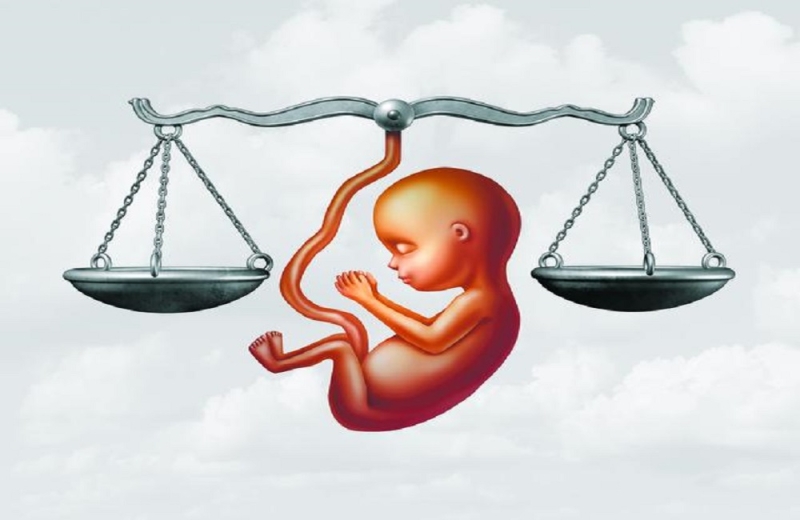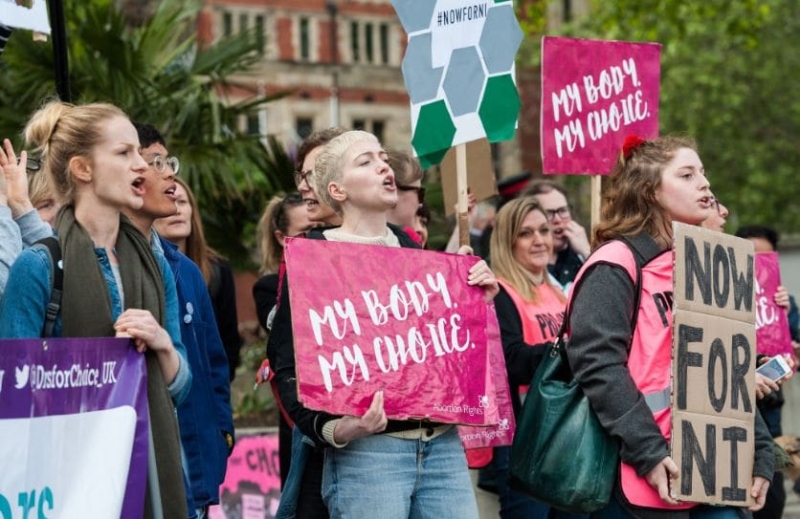
Lately, the whole world has been watching what is going on in the US on the issue of abortion ban. After it became known last week that the US Supreme Court might overturn the historic 1973 ruling that legalized women's right to abortion, politicians rushed to make conflicting statements and protesters in favor of and against abortion took to the streets. Washington to uphold their beliefs. The fact that it has reopened a debate on an issue that was theoretically and mainly practically secured, sounds the alarm bell for many and opens the door to a dangerous setback.
In the same work viewers
A similar incident took place in Europe in October 2020, when the Constitutional Court of Poland ruled that abortions were criminal, leaving women free to proceed with the procedure only if their health or lives were endangered, or if the pregnancy is the result of rape. It is noted that until today and since 1993 abortion was allowed beyond the above two reasons and in case of severe malformation of the fetus, something that with the new legislation is not a serious reason for abortion. The decision provoked outrage in the streets of Poland, as it was seen as a violation of a woman's fundamental right to decide on her body. Every day and for many weeks, thousands of women, as well as all those who opposed the new law, revolted against the basic right they were deprived of, in defiance of the ban on rallies under the pretext of the pandemic. Much of the mass outrage, of course, also turned to the Catholic Church, which supported the far-right government and legislation to criminalize abortion. After a worldwide outcry, voices and protests, this decision finally came… on the ice.
Sticking to the papers… again
In most – at least European – countries, the legality of abortions is now a given (of course there are exceptions, see Malta and Poland). However, the fact that today every woman's decision to have an abortion is respected does not mean that access to it is easy. The bureaucracy on this issue is huge, which leads women concerned to seek solutions in other countries. In particular, even before BREXIT, there was a massive European trend towards the United Kingdom, in which abortions were treated as an issue that did not involve bureaucratic and legal interference. The main reasoning that ran through this country is the fact that each woman has the undeniable right to decide what to do with her body. This is why abortion is perfectly legal and parental consent for ages over 16 is not mandatory. Essentially, the whole English system is based on the idea that children first and foremost receive the information they need about this issue from an early age, and then inadvertently cultivate the critical ability needed to deal with related events. The aim of this philosophy is to create individuals who, on the one hand, have the power to act voluntarily and, on the other hand, are themselves responsible for the decisions of their lives. The situation is similar in the case of France, in which the woman who wants to terminate her pregnancy, has full communication and contact with a psychologist and social worker, in order to ensure her mental integrity and calm. In the past, there was an impression that easier access to abortions was the main reason for the inflated numbers of each country. Indeed, countries such as the United Kingdom and France – which are relatively easy to access – have particularly large numbers and percentages. However, it should be taken into account that many women from different European countries turn to them in an attempt to find a solution to their problem. The question remains: Is easy access to abortions the reason for their increase? Or are bureaucratic and legal difficulties perpetuating the problem?

Dive into danger
In a more general context, the fact that many women who want to have an abortion for any reason seek refuge in a foreign country is enough to justify the huge legal and bureaucratic gap that exists around this issue. . This tendency for “abortion trips” demonstrates the need for a system in which every woman will be truly free to decide on her body, without practical difficulties. Of course, this seems like a utopia, since the bureaucracy for such issues in several countries in Europe is huge. Northeastern Europe seems to have the best policy on such issues, with Germany and the Netherlands having the highest rates at 70.5% and 69.0% respectively. Last in the ranking are Cyprus and Lithuania, with satisfactory policy rates reaching 15% with difficulty. Once again, that is, the inability of southern countries to adequately respond to what is currently considered a taboo subject is evident. It is also noted that a particularly important element is the fact that the -most- southern European countries, not only have extremely low rates in terms of the policies they follow, but also show stagnation in the way they manage issues of this nature./p>
Searching for a strategy
In particular, and in line with the progress of policy and strategy that has taken place in Europe over the last decade, northern and central countries such as France, Lithuania and Sweden have shown significant improvement, while Bulgaria, on the other hand, has declined. Even in an age which at the level of “appearance” is characterized by progressiveness and deprivation in matters that were once considered taboo, many puritanical and outdated features are presented. Today, a woman, although theoretically and legally can choose abortion, is practically difficult, as there are many obstacles. The bureaucracy and time delays that it indirectly imposes, lead women who want such action to be directed, either in countries with a more democratic legal framework on this issue, or in countries that have easier access to the “black market” of abortions “(see Bulgaria). With a quick glance at the overall picture of the problem, one could easily conclude that most European countries are characterized by many difficulties. In other words, Europe seems to be mired in a mentality that bears no resemblance to the progressiveness and innovation it theoretically stands for. Exceptions to the good are mainly the countries of the West, which seem to justifiably and decently represent the characterization that has been given to them as “open-minded”.
What is happening in Cyprus strong>
According to the lawyer Ms. Fotini Michailidou-Christou, in the case of Cyprus abortion (upon request up to the 12th week of pregnancy and up to the 19th week in cases of rape) was fully legalized very recently, in March 2018. Previously it could only take place if there was a risk of physical or mental harm to the mother, if there was a risk of fetal deformity or if the patient was raped or sexually abused. The official number of abortions performed in Cyprus remains unknown at this time, with unofficial figures suggesting 8,500 per year.
Why it concerns us in Cyprus
With much of the planet being swept away by half-hearted restrictions and recent “writing samples” from “spontaneous” and “independent” actors – and seemingly “funny” formations, it is certain that we are watching with great attention this kind of ” upheavals ”, the new bans and the restrictive dispositions regarding the self-disposition of the female body. As innocent or well-intentioned as we think, for the past two years attempts to revive this conversation have come to shake and possibly overturn historic decisions, endangering hundreds of thousands of women.
And contraception strong>
The US Supreme Court's draft ruling marking the revocation of the right to abortion at the federal level and leaked to the media this month could mean that other rights, such as same-sex marriage or this, will be sought in the future. of contraceptive access, US President Joe Biden warned on Wednesday during a campaign rally to raise funds for Democrats, his party.”Note my words: they will turn against (…) the Supreme Court ruling on same-sex marriage,” Biden told donors, adding that access to contraception could also soon be targeted by conservatives. majority of the body.
“You will see these decisions being challenged and the US divided even more. “We will be at loggerheads over things that should not be disputed.”Last week, Biden called on American voters to protect the right to abortion by selecting candidates who pledged to support it in November, following press reports that the Supreme Court was about to overturn the 1973 ruling that at the national level.

Women die
“Women will die” if the US Supreme Court overturns its decision to legalize abortion in the country, the medical review The Lancet warned in its main article, estimating that judges “will have blood on their hands”. In early May, a draft Supreme Court ruling leaked by Judge Samuel Alito leaked to the press that the court intended to overturn the historic 1973 ruling that guaranteed the right of access to abortion for all women, even the most conservative countries.
“The fact is that if the US Supreme Court upholds this draft decision, women will die,” The Lancet wrote in its main article, which was published on its website. “Alito and his allies will have the blood of women in their hands.” “In the US, black women are twice as likely to have unwanted pregnancies as non-Hispanic white women. “And the maternal mortality rate for black women, for whom dangerous abortions are a major factor, is three times higher than that of white women,” the well-known medical review continued.
“What kind of society have they become? “When can a small group of judges injure women, their families and their communities, even when they have been elected to protect them?” he asked. The Supreme Court, in which former President Donald Trump has appointed three Conservative judges, is expected to announce its long-awaited decision on a Mississippi bill before June 30, which significantly limits the time a woman can have an abortion. The draft resolution states that the 1973 Row v. Wade ruling, which based the right to abortion on the constitutional right to privacy, was “groundless” as “not protected by any provision of the US Constitution.” Unless the Court reverses its decision, the United States will return to the pre-1973 situation in which each state was free to allow or prohibit abortion.




